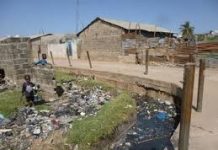 Nutrition organized by the Food and Agricultural Organization ended on Thursday, 4th December 2014, at the Paradise Suites Hotel.
The objective of the workshop, according to the organizers, was to reflect on the experiences of the past two decades of community forestry and its contribution to food security and nutrition and to explore ways of strengthening it as well as make recommendations for action at local and national levels for the development and effective implementation of cross sectoral forestry, nutrition and food security policies.
Abisa Ceesay, a female participant from Lower River Region (LRR), in her contribution, underscored the importance of the forum in helping to increase their knowledge and develop their capacities in enhancing community forestry, food security and nutrition.
She urged FAO to replicate such training workshops in many communities around the country in order to enlighten and involve more farmers and foresters from the grassroots level to get first hand knowledge of the issues.
Alhagie Basse Mboge, President of the Farmers Platform, for his part, commended the presenters and urged his fellow participants to disseminate the knowledge gathered to others.
Mr. Dominic Reed, the FAO official from Rome who led the training, thanked the participants for their time in participating. “We are hoping that all the participants will make the best use of what they have learned. We will continue our support to ensure that local voices are heard at both the national and international levels,” he assured.
In his closing remarks, Mr. Wandi Keita, Director of Agriculture, West Coast Region, thanked both the participants and organisers. He expressed his hope that the recommendations made at the workshop are implemented.
Earlier during the course of the workshop, the participants, including the FAO and Forestry department officials, conducted a field trip to different community forests within the Foni area in order to meet and discuss with community forest owners issues linked to forestry, food security and nutrition. They shared with them experiences and made recommendations on how to protect and harness the forest resources.
Among the recommendations made at the end of the workshop were the development of the capacity of communities, community based organization (CBOs) and the technical staff from the department of Forestry, the introduction of professional forest courses at the University of the Gambia (UTG), establishment of a task force to be headed by local authorities i.e. regional governors, and which should be gender balanced and to ensure that land tenure rights are transfered to the communities.
The workshop was attended by the various stakeholders, including personalities from the department of Forestry, NGOs, CBOs, farmers representatives, regional governors and councils.]]>
Nutrition organized by the Food and Agricultural Organization ended on Thursday, 4th December 2014, at the Paradise Suites Hotel.
The objective of the workshop, according to the organizers, was to reflect on the experiences of the past two decades of community forestry and its contribution to food security and nutrition and to explore ways of strengthening it as well as make recommendations for action at local and national levels for the development and effective implementation of cross sectoral forestry, nutrition and food security policies.
Abisa Ceesay, a female participant from Lower River Region (LRR), in her contribution, underscored the importance of the forum in helping to increase their knowledge and develop their capacities in enhancing community forestry, food security and nutrition.
She urged FAO to replicate such training workshops in many communities around the country in order to enlighten and involve more farmers and foresters from the grassroots level to get first hand knowledge of the issues.
Alhagie Basse Mboge, President of the Farmers Platform, for his part, commended the presenters and urged his fellow participants to disseminate the knowledge gathered to others.
Mr. Dominic Reed, the FAO official from Rome who led the training, thanked the participants for their time in participating. “We are hoping that all the participants will make the best use of what they have learned. We will continue our support to ensure that local voices are heard at both the national and international levels,” he assured.
In his closing remarks, Mr. Wandi Keita, Director of Agriculture, West Coast Region, thanked both the participants and organisers. He expressed his hope that the recommendations made at the workshop are implemented.
Earlier during the course of the workshop, the participants, including the FAO and Forestry department officials, conducted a field trip to different community forests within the Foni area in order to meet and discuss with community forest owners issues linked to forestry, food security and nutrition. They shared with them experiences and made recommendations on how to protect and harness the forest resources.
Among the recommendations made at the end of the workshop were the development of the capacity of communities, community based organization (CBOs) and the technical staff from the department of Forestry, the introduction of professional forest courses at the University of the Gambia (UTG), establishment of a task force to be headed by local authorities i.e. regional governors, and which should be gender balanced and to ensure that land tenure rights are transfered to the communities.
The workshop was attended by the various stakeholders, including personalities from the department of Forestry, NGOs, CBOs, farmers representatives, regional governors and councils.]]>





















